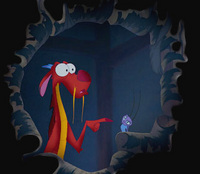Maxine Hong Kingston’s struggle with identity can be traced explicitly to her childhood in White Tiger. In the first paragraph of this chapter, she writes innocently that “perhaps women were once so dangerous that they had to have their feet bound” (3). The childlike theory presents both ideas of womanhood that Kingston comes to know. The talk-stories that are told to her by the womanly figures in her life remind her of the great woman-warrior, Fa Mu Lan, while the painstaking limits of modern society restrain her from viewing this as anything but a fairy tale. But it is important to recognize that her daydream as Fa Mu Lan takes up a considerable amount of time in this chapter. Upon a first reading, it is easy to assume that this tale is simply a re-telling of the story of the woman warrior, but a closer look will reveal that Kingston frequently weaves herself and her own childhood into this story. Aside from telling it in first person, Kingston describes certain aspects of the “mountain” from a distant point of view. Her explanation of the scenery, for example, involves referring to the mountains and clouds as if they were but paintings. Then again, when the old man and woman offer her rice, she notes that she would rather have cookies. These references are included to remind us that the identity of this story belongs with Kingston as much as it does to Fa Mu Lan.
The second section in this chapter describes Kingston’s life in full, miserable detail. She strives to get straight A’s, but her parents merely brush it off as an afterthought. She is still looked down upon in a working environment for being not only Chinese, but a woman. This lifestyle is quite different to that of a woman warrior, indeed. Fa Mu Lan was raised to be loved and cherished for all of her gifts and talents–meanwhile Kingston can’t even get a smile for bringing home good grades. There is great significance in why Kingston chooses to include both versions in this chapter. Smith and Watson write that “remembering has a politics. There are struggles over who is authorized to remember and what they are authorized to remember, struggles over what is forgotten, both personally and collectively” (24). The importance of Kingston’s childhood is overlayed with this sense of desire to be a warrior as well as a woman. She chooses to hold the memory of this talk-story close to her heart, which later inspires her to fight with the only weapons she reveals that she has: her words. In the final section of this chapter, Kingston writes that, like Fa Mu Lan with her sky sword, she can use her words to vanquish racial prejudices and cultural stereotypes of her world.


